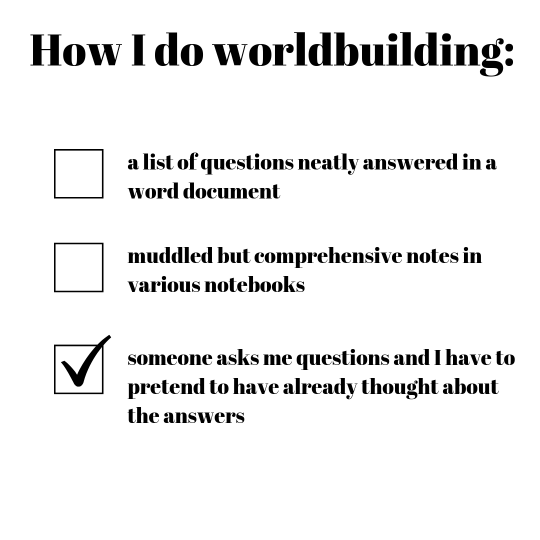Text
What is your Favourite Type of Weather?
Daily writing promptWhat is your favorite type of weather?View all responses
When it comes to writing weather, pathetic fallacy is a technique you can always fall back on to set the mood of your scene. And, airhead writer that I am, I like to let the mood of the sky affect the mood of my writing.
What is Pathetic Fallacy?
Pathetic fallacy is a rather fancy term to describe when you use…

View On WordPress
#blogging#dailyprompt#dailyprompt-1886#More About Me#pathetic fallacy#personal blogging#weather#weather writing
0 notes
Text
What Tattoo do you Want and Where Would you Put It?
Daily writing promptWhat tattoo do you want and where would you put it?View all responses
Tattoos can seem like a pretty scary thing. After all, you’re putting an image on your body that’s more than likely to be there forever. The thought of having to settle on a design that you’ll still want etched into your flesh even decades after you first got it is pretty daunting.
I do, however, already…

View On WordPress
0 notes
Text
What is it? If, like me, you’ve been fairly active on online writing spaces, be it reposts of Tumblr screenshots on Pinterest, or avidly following all your favourite authors on Instagram, chances are you’ve come across this term.
It’s a fairly popular piece of grammar to use, but also a pretty controversial one. Some people (like me) use it all the time, while others will avoid it at all costs.
What it actually is, is a comma that goes at the end of a list before the ‘and.’ Like so:
I bought apples, pears, bananas, and oranges.
I bought apples, pears, bananas and oranges.
The first example above uses the Oxford comma, while the second does not.
The reason I and so many others swear by it is the clarity it can add to a list without overly complicating the structure of a sentence. For instance, if you’re including a pair of items in a list, or something that might be misunderstood as a pair when you don’t want it to be, an Oxford comma can simplify matters without you having to contort the structure of your list just for it to make sense.
I invited my friends, Linda and John.
I invited my friends, Linda, and John.
Now, looking at this, you would think from the first example that Linda and John are the friends being invited, but in the second, the friends are more clearly a different group of people.
You could, of course, avoid this by rearranging the list to be:
I invited Linda, John and my friends.
This doesn’t need an Oxford comma to be clear to understand, but even here in terms of the rhythm of the sentence, it just sounds better with one. Also, when you have a more complicated example than this, it can become quite difficult to reorder the list without it ending up sounding all clunky.
In another example below, the same sort of rule applies, but here we’ve got a ‘paired’ item in the list.
I study Music, English and Design and Technology.
I study Music, English, and Design and Technology.
This makes it a little more complicated, too, because, if you’re familiar enough with the two words being paired together to mean a separate thing than what they might mean together, then the addition of the Oxford comma isn’t especially important. But if you aren’t, the comma serves to separate the items in the list more clearly. Without it, it’s very much possible that the items could be read separately and the reader might just think you’ve worded the sentence a bit weirdly or, if it’s in a bit of dialogue, want to make someone’s speech mannerisms more accentuated.
Of course, these are all fairly minor things to be considered when reading a list, and can often be overcome by simply reading in the context of the rest of the text, but in my opinion at least, the Oxford comma adds an invaluable extra level of clarity that isn’t achieved otherwise.
Overall, whatever you decide, what’s most important is consistency. Don’t go using it in one paragraph and then a few lines later write another list without it!
Are you for or against using the Oxford comma? Let me know in the comments if you have any interesting thoughts on this pesky little piece of grammar!
-Olive Tree
header image by Paisley Diaries. source.
0 notes
Text
Fate and destiny are often very important in spiritual contexts, and for someone with very few ties to the realms of spirituality and religion, it’s easy to forget that these things could actually be considered a real part of our world.
The idea that all the decisions we have made and ever will make are all pre-determined, however, steps beyond the limits of these concepts. It even makes a show in psychology, in the big debate of nature vs nurture. If the genetic makeup of every living being dictates their behaviour, then our responses will always be the same when we face a given situation. Of course, in a practical sense, this idea cannot be proven as even the tiniest of changes between one setting and another, even down to a few seconds’ time difference, can be enough to alter our behaviour quite significantly.
If you think about it from the very beginning of time – not in a literal sense, but, say, in an imaginary world where the first living being, you, has just come into existence. This world has nothing else in it except for you. Now, if your genes will always respond the same to any given situation, theoretically, if someone knew the makeup of your genes and had some genius way of calculating exactly what those genes would cause you to do in that setting, they could accurately predict exactly what you would do for every moment for the rest of your existence.
Now, this idea relies on this theoretical someone also knowing every detail of your past life, but in our little imaginary world, you don’t have one. You’ve just come into existence, memory as fresh as a newborn baby’s. Thus, your genetics are all you have to go on for your first decisions, before experience can have any effect on the choices you make.
If this concept is true, then the idea of free will is not. But there is, much like most significant philosophical debates, no way of proving or disproving this.
Do I believe it?
Well, that’s the question that prompted this post, isn’t it?
I don’t believe in the theory I just described. Partly because it simply seems unrealistic to me, and partly because, even if it is true, choosing to believe it would likely cause me to live a less happy life, with much less motivation if I’m convinced I don’t have any choice about what I’m doing. Humans are designed to believe they have full freedom to make decisions; it makes us happier as creatures on this planet.
But as for fate?
Well, in my eyes, fate is a lot less restrictive than the idea that we have no free will at all. Often, in the books I’ve read, it’s simply a couple of sentences that describe some achievement someone will make.
If I were to go somewhere and have my future read out to me, I do believe that that specific future would be more likely to happen, if only because (if it’s a future I desire) I would be actively trying to make it happen. If it’s one I don’t desire, I doubt that I would attempt to make it a reality, but the fact is once an idea is lodged in your mind, you’re more than likely, if you spend much time thinking about it, to compare what actually happens with what you were told until the two become so similar that you have no choice but to believe the prophecy was right.
So yes, in a way I suppose I do believe in destiny.
Not necessarily in the cosmic-alignment, decree of the Gods kind of way, but at the very least in the sense of a ‘self-fulfilling prophecy.’ And I think part of the truth is, I do want to believe.
I want to believe in some power beyond what is tangible so bad that I’ve dedicated my whole life to exploring things that aren’t real. Secretly, I probably want to be more powerful than I possibly ever could be in this world, but that’s a whole god-complex-flavoured can of worms that I don’t think I’ll be opening any time soon.
-Olive Tree
#my blog#blog#blogging#writing blog#fate#destiny#psychology#philosophy#free will#sorry these tags are kinda generic this time lol
0 notes
Text
i love writing several full blog posts instead of doing my uni work. procrastinating. as per usual.
0 notes
Text
Aaaand it’s been another few months since my last post.
What with starting university and all that that entails (notably: actually having a social life!), I’ve actually been quite busy. Very busy, in fact. Who knew that studying for a degree could take so much time and energy?
Well, this is a post to let you all know that I’ve finally (hopefully) settled down into the rhythm of university life and should now be able to make some time to tend to this blog properly. As promised, the colour scheme has been toyed with a bit, as well as a few other features of the blog’s appearance, mostly to make it more accessible but also just to make it a little bit more exciting to look at.
I’ve got a few plans in the works as to new post ideas, so you’ll have to keep an eye out over the next few weeks to see what they are! >:3 They’ll certainly add to my motivation to keep this blog running and hopefully make some friends in the process.
-Olive Tree
0 notes
Photo

Lunar Womb - The Sleeping Green
Tour De Garde
2016
20K notes
·
View notes
Text

Trinket.
17 notes
·
View notes
Text
There have been so many times over the last few years that I’ve shirked the idea of going over things I’ve written before submitting them. In some cases, all this means is that I’ve got a few very rough drafts of novels that I’m probably never going to touch again. In others, it means I’ve got a problem.
You can’t really pursue a career where you have to do any significant amount of writing without the ability to go back over your work and at least do the bare minimum of proofreading it for grammatical mistakes. That said, it isn’t always an easy or enjoyable thing to go back and reread what you’ve written and face the possibility that you’ll hate all of it and have to start again from scratch. Nevertheless, it is an essential skill and there are ways of making it both easier and more enjoyable.
So how do I do it?
There’s the most obvious way of avoiding this: getting someone to do it for you. Maybe you can beg a friend to help, or hand your laptop over to a parent for as many minutes as you can stand to let them interfere with your work. With their advice, the process of reviewing your writing becomes a lot shorter – for you, at least – and saves you from having to look at the whole piece if they give you specific areas where your writing is weaker.
But that isn’t always an option, and of course, having someone do it for you doesn’t actually address the problem here.
Break it into pieces.
With smaller chunks, the workload can be a lot less daunting – especially if you’re working with a novel or a particularly lengthy essay. This is a useful tip for pretty much any decently sized piece of work you have to do, but you can even go as far as separating a particularly difficult sentence out into its own paragraph to make it easier to look at how each it works individually rather than struggling to find the issue with it when it’s hidden in amongst a larger block of text.

Change the font!
This is advice I’ve seen many times from various different sources, but it does truly work. If you wrote in a serif font (the ones with the fancy little caps at the ends of letters,) changing to a sans-serif one changes the appearance enough that it can feel as if you’re looking at a completely new document.
In addition to this, using less ‘formal’ fonts like comic sans can take away some of the pressure of working with a finished document and allow you to make edits and rehash your work without feeling as if you’re tampering with a finished document. Sans-serif fonts are also designed to be easier to read, and have even been known to improve reading speed and accuracy, which is another factor to consider if you’re wanting to think of ways to make the process of editing less time-consuming.
Print it off!
This is another thing that can make your life a whole lot easier. Sometimes, looking at the work you’ve typed out again on a screen can make it feel as if the effort of editing it is all one static process that erases the feeling of progress, especially if you’re someone who, like me, is inclined to check their word count at regular intervals to monitor their progress.
Having a hard copy in front of you that you can scribble all over and highlight as you like far more easily than you could with a digital document is great for longer documents, or really anything that involves longer chunks of text. And, once you’ve got a fully annotated sheet of paper or two, there’s a lot more evidence of the effort you’ve put in.
When you have made all the notes you need to perfect your draft, it is often easier to rewrite the whole piece onto a new document. While it may take a little while longer, it ensures that you aren’t making changes without actually checking that the surrounding text also makes sense after the edits have been made (e.g. if you decide to change the tense of a section and also add a new phrase, it’s possible to simply add the phrase in the desired tense and forget to apply it to the whole sentence or paragraph if you’re just editing an existing document.)
Overall
Along with all these specific pointers, it’s always useful to take regular breaks between working and to find the ways that work best for you to be able to focus, whether that might be locking yourself away in your room with your phone outside the door and working in peaceful silence, or sticking a pair of headphones on at the library. Here, I’ve mostly been focusing on the techniques that make it easier for me to reduce the time that I have to be editing my work and make the editing that I do do more effective.
Of course, proofreading and editing one’s work isn’t such a chore for everyone; even I enjoy it (when it’s not my own writing I’m editing.) If you have different methods that make the process more enjoyable for you, please leave them in the comments!
-Olive Tree
1 note
·
View note
Text
What's that poem about the cockroach and the moth where the cockroach is like "I wish I've ever wanted anything the way that moth wanted to burn itself up in that lantern" because we had to read that in high school and it still fucks me up to this day
78K notes
·
View notes
Photo
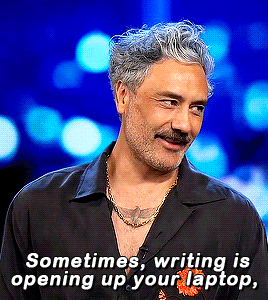
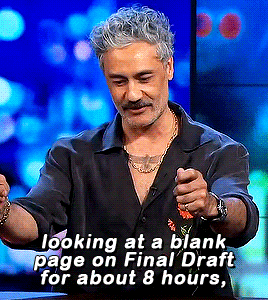
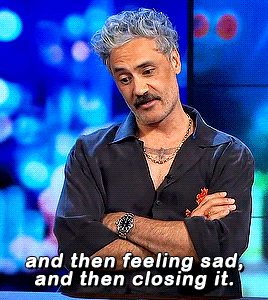
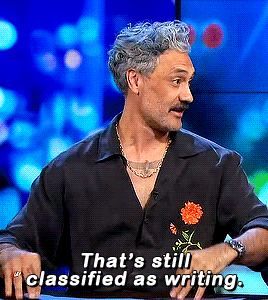
What’s writing, you know? What does writing actually mean?
105K notes
·
View notes
Text
A little shocked I have to say this but please don't feed my work, my writing or my art, to any AI for generative purposes or otherwise. Generative AI is theft, and innocent intentions are not an excuse.
I'm not going to explain why generative AI is bad, many artists and writers have already done that much more eloquently than I ever could. Do your own research. I work professionally in art and have been deeply personally impacted by AI, and seeing AI versions of my characters is deeply upsetting.
4K notes
·
View notes
Text
Hey, I usually don't make serious posts, but this one is a big deal to me and many other small creatives, so please read or spread the message, especially in light of the WGA and SAG-AFTRA strikes.
Google Labs is introducing a new ai that will just scrape your documents for ideas, plots, and other things to feed its algorithms. This information is stored SEPARATELY from your Google account.
Google will be collecting this user data and have at their disposal the ability to have free scripts for any content they want to produce without giving a cent to the original authors of these scripts, novels, character organizers, fics, etc. that the ai would be heavily basing these generated stories on. But that's not all, these ai's are also showing these works to human reviewers in order to "help improve quality of products" sharing works without consent of the author with real actual people to see if the ai is responding well enought to the prompts and imput (aka the intire documents as this is a fully intagrated ai -_-)
The reason this is going to be so terrible is that not if but when Google decides to open a production company (youtube movies will be first but they likely will open another streaming platform) these scripts their ai wrote them are probably going to be almost wholly plagiarized from docs user content that was stolen, without paying an actual writer anything at all.
If you are at all creative in the slightest PLEASE get your work off of docs before the features are fully integrated, scrub your google drive, and move to another program. Mircosoft, Libre (free and open source) ANYTHING to protect your works and if possible move away from Google products generally. Use a different search engine even. I'm going to link two TikTok creators from who I found this information as well as a list of alternative products to use away from Google in hopes to avoid them. Make them feel the backlash. It doesn't matter if they already have your data take charge of your internet person and DON'T GIVE IN
Ecosia (browser)
DuckDuckGo (browser)
Microsoft Products (Not amazing but not drifting yet, I like the free version enough)
Libre Office (free & open source!!)
Waze (maps)
Please add on if you can any information or resources! Stay vigilant and stay informed
3K notes
·
View notes
Text
All for the Game is a series that truly transformed my reading experience back in the summer of 2020 when I read it for the first time. I remember taking the trilogy with me on a week-long beach holiday with my parents and regretting not bringing any more books with me for how fast I tore through them. I managed to keep myself fairly occupied by my own fantasies of how the characters would have reacted had they materialised before me or happened to be playing on the beach as I walked past. I could go on forever about all the details that go into this series and the emotions that I felt upon reading that were captured just as vividly even on my second re-read, but I’ll keep this relatively short.
The second book, The Raven King, (not to be confused with the novel of the same name by Maggie Stiefvater) kicks up the gory side a lot. This is the point where I warn anyone who hasn’t read it yet, and might be planning to, to check the trigger warnings for some pretty upsetting content that appears in both this second book and the third one also with too much plot relevance to be easily skipped over. There’s some harsh language and questionable drug use from the first book too, but the latter two books are the most heavy-handed with the explicit depictions of some quite horrific events.
For a series that has been published independently, it holds up well in terms of its quality when compared to other popular staples in the YA genre. The fact that it has been independently published rather than through an agency somewhat serves to highlight and mirror the narrative of the PSU Foxes as they scrabble together a found family of sorts from a bunch of traumatised and troubled young adults. The rawness of the writing itself only highlights this, making it easy for any angsty YA reader to latch onto, which really isn’t a bad thing when it comes to this series. All for the Game truly does master the art of creating almost stupidly dramatic scenarios and making them feel relatable to anyone that’s ever experienced any feelings of anger or worthlessness.
This series is so close to my heart it’s rather difficult to write objectively, or with a particularly analytical mindset about it, but it really is done rather well. The pacing is kept throughout the series, climaxing towards the final instalment and allowing a fair (if very slightly excessive) conclusion to ensure the characters’ arcs have been fully tied up. None of the leaving-enough-knots-untied-to-potentially-squeeze-another-spinoff-out that seems to plague almost every form of media in the current age, it encapsulates the whole story of Neil Josten and the other Foxes within its several hundred pages.
Neil’s narration plays its own part, making him an excellent, and frequently hilarious, unreliable narrator. The way Sakavic uses this as a tool to convey Neil’s own opinions without overly clouding the reality of the events beyond the character’s perspective is a finely-balanced art. While he’s not always the most honest about his own feelings, Neil’s perceptiveness makes for a fascinating angle that really uplifts the whole story.
Overall
I’ve already told you how much I absolutely adore this series, for personal reasons probably a little more than technical writerly ones. But gosh does it pull on your heartstrings. If you have the nerve to tolerate the hefty trigger list All for the Game comes with, absolutely give it a read!
Rating: ★★★★★
-Olive Tree
#my blog#book review#book recommendations#aftg#all for the game#the foxhole court#the raven king#nora sakavic#the king's men#booklr
6 notes
·
View notes
Text
Update!!
It’s been a while. Several months, in fact, since I last posted.
And look: the whole colour theme of this blog has changed! Which has rendered a couple of pages almost completely unreadable. I am going to fix this within the next few days, so please bear with me.
As for once I’ve finished updating Write Let’s Do This’ appearance, well, I’ve got a few ideas in mind. After all, even though I haven’t been posting anything here for a good while, I have still been reading, and I have plenty of thoughts to share with you.
The Music and Musings series will, for the time being, be ended, so consider the previous posts for it a season one as I have no doubt I’ll want to bring it back and share more of my musical discoveries with you as time goes on!
If you have any particular suggestions or ideas for what you’d like to see me post here, whether it’s more of something I’ve already done, or maybe some more information about any of my writing projects, please let me know!
And, before I dive back into meddling with WordPress’ layout, I’d just like to thank you all for sticking around. I didn’t give any notice for my disappearance, despite planning to, but I’ve learnt from my mistakes there and will definitely be giving a bit more notice if I ever have to vanish like that again.
-Olive Tree
0 notes
Text
Terms every writer should know
Here’s a quick cheat-sheet to some common terms you may run into during your writing career!
Alpha reader: A person that reads the manuscript with the knowledge it is unfinished and provides content feedback & support (like a coach, mentor or friend).
Beta reader: A person that reads the manuscript for the purpose of finding plot holes, sensitivity issues, and provide feedback, pre-publication.
Back matter or End matter: Additional content at the end of a book, such as acknowledgements, author bio, afterword, etc.
Front matter: Content preceeding the beginning of a book, such as publication information, dedication, title page, table of contents etc.
House: A publishing house.
Developmental editing: Editing that helps develop the content of a book, point out logic, inconsistencies, and focus the idea.
Line editing: Editing that helps the consistency and concision of the author’s style, finds redundancies, and fixes grammar.
Copy editing: Editing that focuses on grammar, punctuation, spelling and vocabulary.
Passive voice: In passive voice, the subject is the person or thing being acted upon.
Active voice: In active voice, the person or thing performing the action serves as the subject of the sentence.
Flash fiction: Extremely short stories, usually of up to 1,000 words.
In medias res: Starting the narrative from the middle of the story.
Deus ex machina: Term for a common trope where all issues are resolved by a god-like force, typically when one writes themselves into a corner and cannot resolve the conflict in any other way.
Head hopping: A common error in narrative perspective, where the writer gives access to internal thoughts of two or more characters within a scene.
Dialogue tags: Sentences that frame dialogue to let the reader know who’s speaking.
Story beat: A structural element of narrative that signals a shift in tone, plot, or character. Can be used for chapters, scenes, and outlines.
Pacing: The rate at which a story progresses.
Pinch point: An event in the plot that adds pressure to the characters.
Plot point: A major turning point in a story structure.
Logline: The story summary in one single sentence, much like a premise or an elevator pitch.
Synopsis: A detailed description of a story’s plot, for the purpose of sharing with literary agents.
R&R: Revise & resend: A changed or revised manuscript requested by agents or editors.
Manuscript: The main body of an unpublished book.
Shelf time: The time during which you set aside your project to come back to it with a fresh perspective.
Zero draft or vomit draft: A draft written by the author solely for themselves, used to get the story out on the page without external pressure.
Exposition: Where background explanation about the story, world, or characters is provided.
Subtext: The meaning behind the text, the dialogue, the plot, or the characters.
MC: Main character.
Motif: An image, phrase, or symbol repeated throughout the book for thematic significance.
Theme: The moral statement, argument, or question at the heart of a story.
Trope: A cliched story element, particular to certain genres.
Save the post so you can find them easily 😊
8K notes
·
View notes
